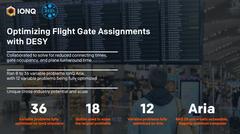URL: https://www.desy.de/news/news_search/index_eng.html
Breadcrumb Navigation
DESY News: DESY-IonQ collaboration shows Quantum’s Potential Benefits to solve complex challenges
News
News from the DESY research centre
DESY-IonQ collaboration shows Quantum’s Potential Benefits to solve complex challenges
DESY and IonQ, a leading firm in the quantum computing industry, present early results from their cooperation to run combinatorial optimization problems on IonQ’s quantum system. The results demonstrate quantum computing’s potential as a more effective solution than traditional classical computing when tackling equations with multiple variables in a dense environment – such as in a bustling airport. A publication explaining the project, which is part of DESY´s quantum technology initiative, has now been published on the arXiv preprint server.

Information for experts. Picture: IonQ
Quantum Techniques that have been used for the flight gate assignment problem have also been used for particle reconstruction in high energy physics, e.g. at the LUXE experiment at DESY. Such techniques can also be extended, e.g., to traffic, i.e. finding a better bus schedule in a city. DESY researcher Karl Jansen, head of the CQTA, and his team is also it is planning to look into the optimization of an energy network together with researchers from the Forschungszentrum Jülich employing again similar methods as used in the flight gate assignment problem.
“We are pleased by the initial results we’re seeing in running quadratic assignment problems across IonQ’s quantum hardware within a nice collaboration with IonQ,” says Jansen. “While it’s still too early to tell what real-world value these algorithms will generate for airports when it comes to flight gate optimization, the learnings gathered here can easily apply to other research and industries where the presence of multiple variables creates too complex of a problem for classical systems to handle.”
“The results achieved from our work with DESY are indicative of the real-world value quantum computers can deliver when addressing optimization problems that factor dozens of variable scenarios,” says Peter Chapman, CEO and President of IonQ. “Optimization problems are ubiquitous across all industries, including manufacturing, logistics, finance, pharma, and more. Quantum computing presents a huge opportunity for businesses to innovate across this problem space and remain at the forefront of innovation, tackling problems once deemed unsolvable.” The final report of the project is expected to be published in the coming months.
Reference and further information
Simulating the flight gate assignment problem on a trapped ion quantum computer; Yahui Chai, Evgeny Epifanovsky, Karl Jansen, Ananth Kaushik, Stefan Kühn; https://arxiv.org/abs/2309.09686
Press release of IonQ
Blog post of IonQ



